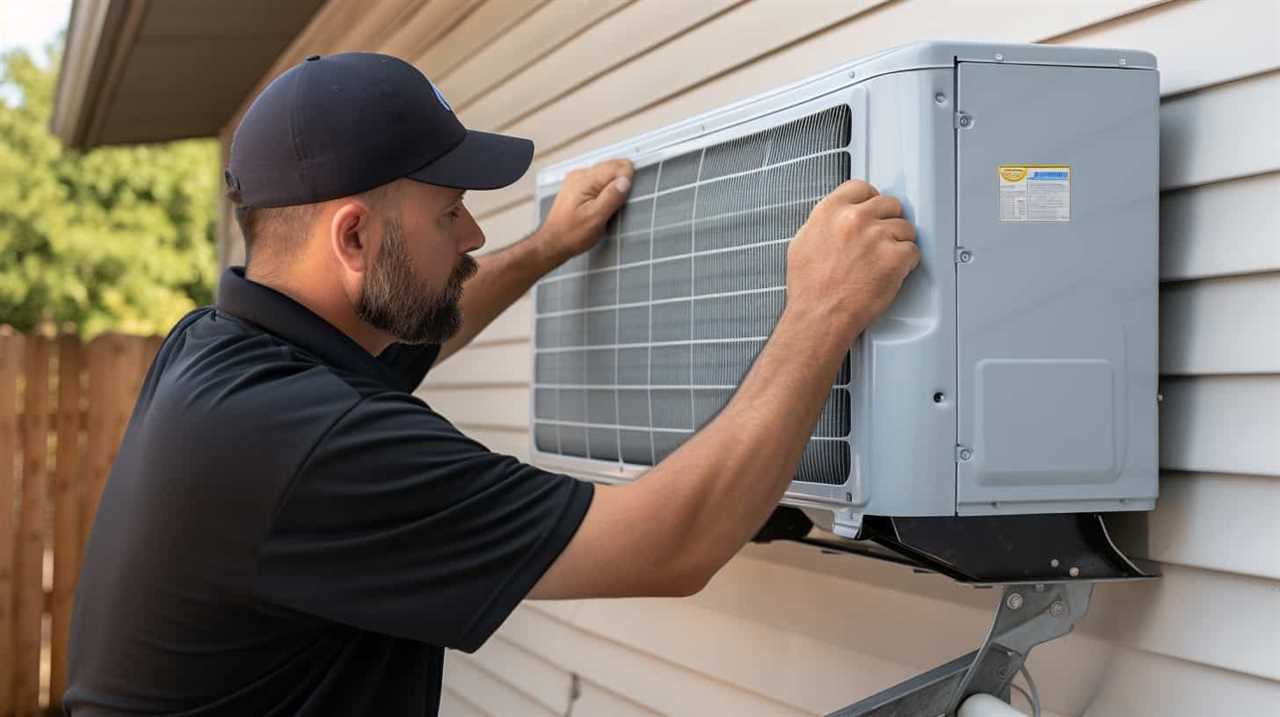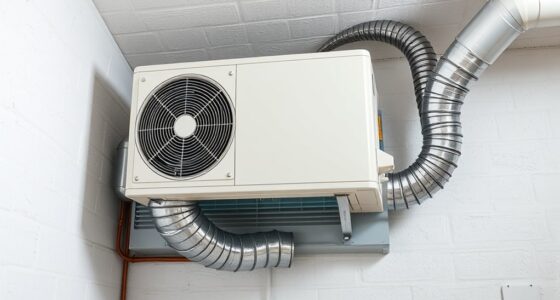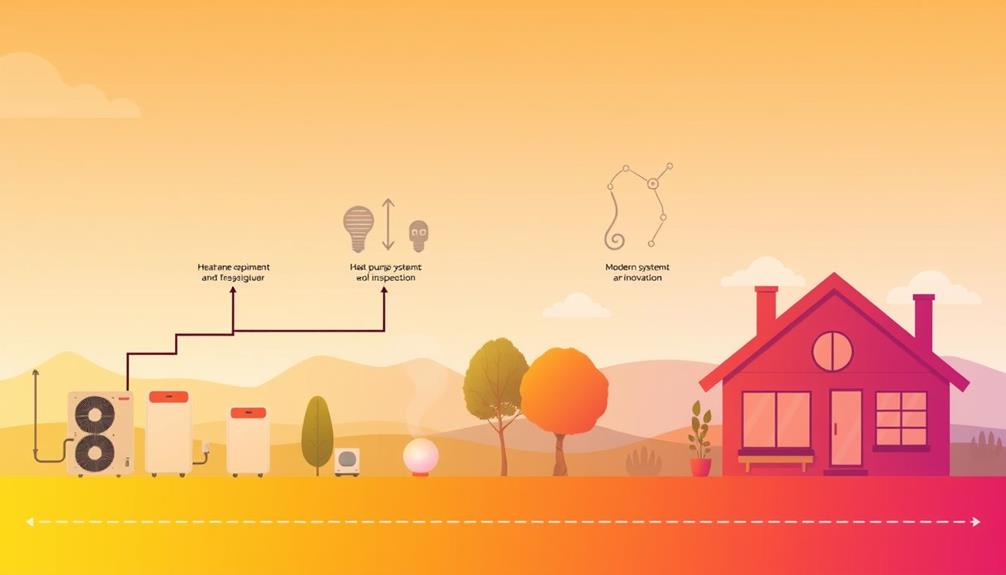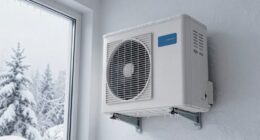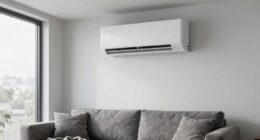Did you know that heat pump systems are not only energy-efficient but also environmentally friendly?
In our guide, we will show you how to make your home more sustainable by using these innovative heating systems.
We’ll explore the different types of heat pump systems, discuss their benefits, and guide you through the installation process.
Additionally, we’ll provide tips on operating and maintaining your heat pump system for optimal efficiency.
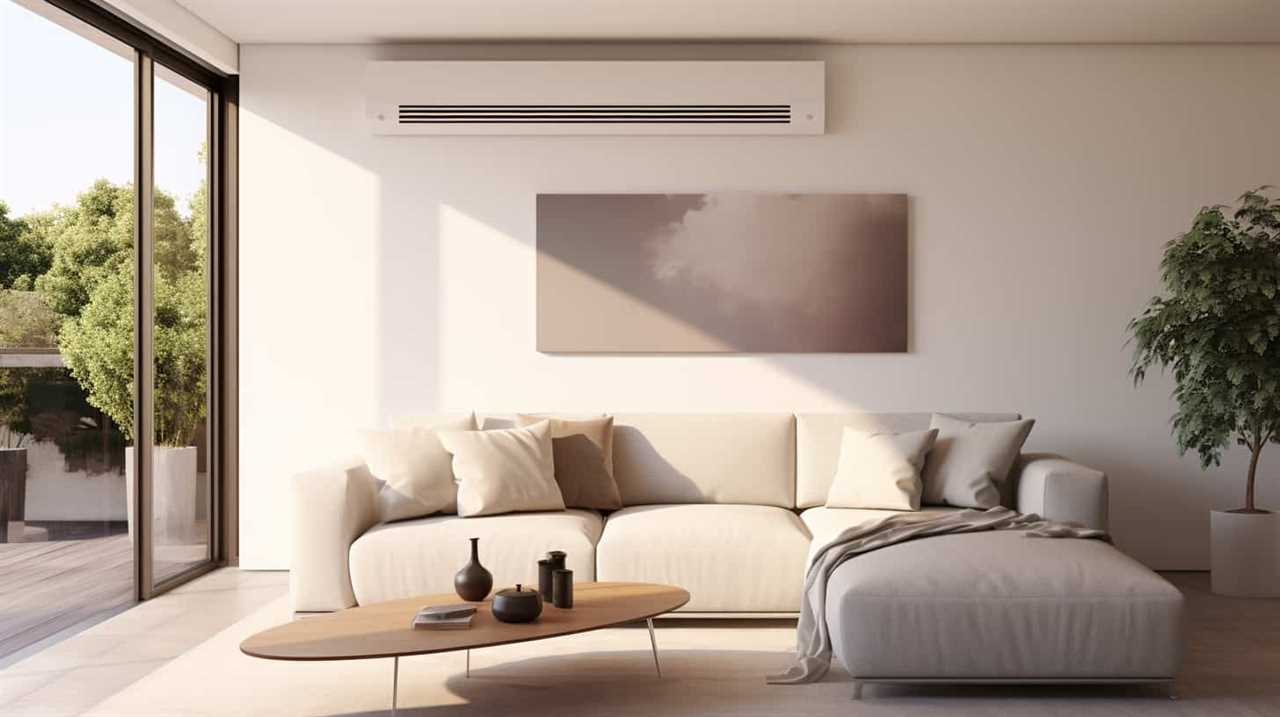
Join us on this journey towards a greener home!
Key Takeaways
- Heat pump systems are efficient and reliable for heating and cooling homes.
- They have a positive impact on the environment by reducing greenhouse gas emissions and using renewable energy sources.
- Considerations such as cost, energy efficiency ratings, climate conditions, and supportive infrastructure should be taken into account before installing a heat pump system.
- Regular maintenance and occasional repairs are necessary for optimal performance and long-term cost evaluation.
Types of Heat Pump Systems
Now that we’ve discussed the benefits of eco-friendly heat pump systems, let’s explore the different types available for installation.
When it comes to heat pump systems, there are three main types: air source heat pumps, ground source heat pumps, and water source heat pumps.
Air source heat pumps are the most commonly used type and work by extracting heat from the outside air and transferring it into your home. They’re affordable, easy to install, and require minimal maintenance.

Ground source heat pumps, also known as geothermal heat pumps, use the constant temperature of the ground to heat or cool your home. They’re highly efficient and can provide significant energy savings in the long run.
Water source heat pumps utilize a water source like a pond or well to extract or dissipate heat. They’re versatile and can be used in both residential and commercial settings.
Thanks to recent advancements in heat pump technology, these systems have become even more efficient and reliable. Regular heat pump maintenance is essential to ensure optimal performance and longevity. It’s recommended to have a professional technician inspect and service your heat pump annually.
Benefits of Using Heat Pump Systems
There are several benefits to using heat pump systems in our homes. These systems not only provide efficient heating and cooling, but they also have a positive impact on the environment. Here are some key advantages of using heat pump systems:
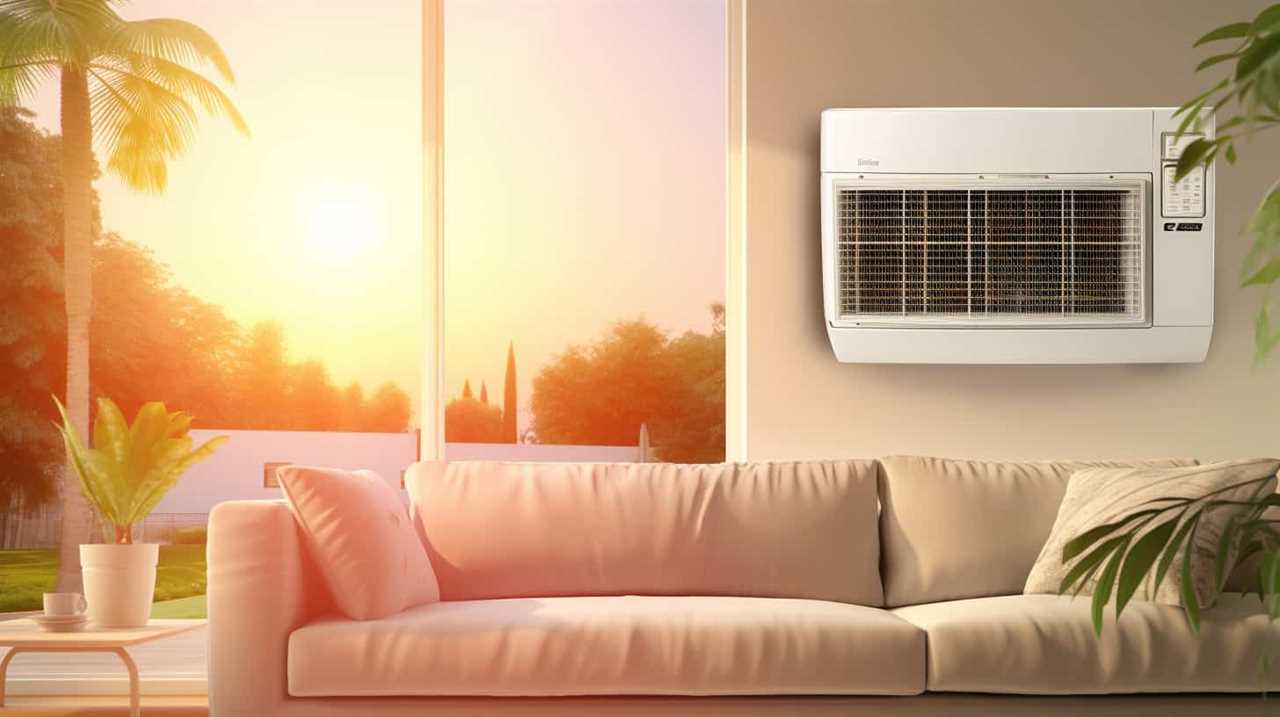
-
Energy savings: Heat pump systems are highly efficient and can save you money on your energy bills. They transfer heat rather than generating it, resulting in significant energy savings compared to traditional heating and cooling systems.
-
Environmental impact: Heat pump systems use renewable energy sources, such as the heat from the air or ground, to provide heating and cooling. This reduces greenhouse gas emissions and helps combat climate change.
-
Versatility: Heat pump systems can provide both heating and cooling, making them a versatile option for year-round comfort.
-
Long lifespan: Heat pump systems are built to last, with an average lifespan of 15-20 years. This means you can enjoy the benefits of energy savings and environmental sustainability for many years to come.

Factors to Consider Before Installing a Heat Pump System
Before installing a heat pump system, there are several factors to consider.
Firstly, cost considerations are important as heat pump systems can vary in price, and it’s essential to determine a budget that suits your needs.
Secondly, energy efficiency ratings should be taken into account to ensure maximum efficiency and savings in the long run.
Lastly, the suitability of the heat pump system for your climate conditions is crucial, as different models may perform better in certain climates.

Cost Considerations
What are the cost considerations we should take into account before installing a heat pump system?
-
Initial cost: A heat pump system can be more expensive to install compared to traditional heating and cooling systems. However, it’s important to consider the long-term cost savings it can provide.
-
Energy efficiency: Heat pump systems are known for their high energy efficiency, which can lead to significant savings on utility bills over time.
-
Maintenance and repairs: Like any other HVAC system, heat pumps require regular maintenance and occasional repairs. It’s crucial to factor in these costs when considering the overall expense of installing a heat pump.

-
Environmental impact: Heat pump systems are eco-friendly and have a lower carbon footprint compared to conventional heating systems. Consider the long-term environmental benefits when evaluating the cost of installing a heat pump.
Energy Efficiency Ratings
Considering the energy efficiency ratings is crucial when installing a heat pump system in our home. These ratings provide valuable information about the system’s ability to convert energy into heat efficiently, which directly affects our energy consumption and cost savings. To help you understand the importance of energy efficiency ratings, here is a table that highlights the key factors to consider:
| Energy Efficiency Rating | Description | Energy Saving Tips |
|---|---|---|
| SEER (Seasonal Energy Efficiency Ratio) | Measures cooling efficiency | -Keep windows and doors closed -Use ceiling fans to circulate air |
| HSPF (Heating Seasonal Performance Factor) | Measures heating efficiency | -Set thermostat to a comfortable but lower temperature -Insulate walls and ceilings |
| COP (Coefficient of Performance) | Measures overall efficiency | -Regularly clean and maintain the heat pump system -Seal any air leaks in the ductwork |
Suitability for Climate Conditions
Now, let’s explore how heat pump systems can be suitable for different climate conditions and understand the factors we need to consider before installing one in our home.
When considering the suitability of a heat pump system for our climate, there are a few key factors to take into account:
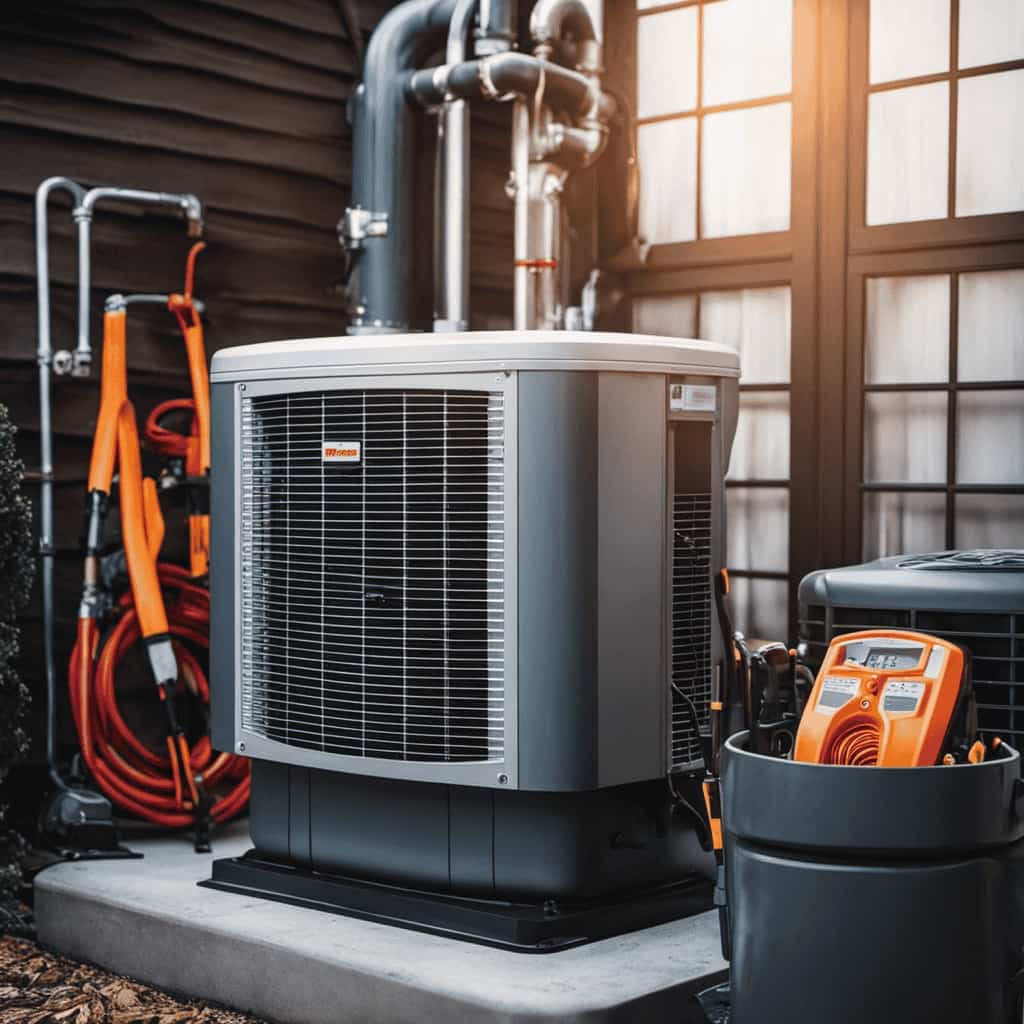
-
Geographical limitations: Different heat pump systems work best in different climates. For example, air-source heat pumps are most effective in moderate climates, while ground-source heat pumps are better suited for colder regions.
-
Impact on energy consumption: Heat pump systems are known for their energy efficiency. However, it’s important to consider the impact on energy consumption in our specific climate. Factors such as temperature extremes and humidity levels can affect the efficiency of the system and its overall energy consumption.
-
Supportive infrastructure: Before installing a heat pump system, it’s crucial to ensure that our home’s infrastructure, such as insulation and ductwork, is in good condition. This will maximize the effectiveness of the system and minimize potential energy losses.
-
Professional consultation: To determine the suitability of a heat pump system for our climate, it’s advisable to consult with a professional. They can assess our specific needs, climate conditions, and recommend the most suitable heat pump system for our home.
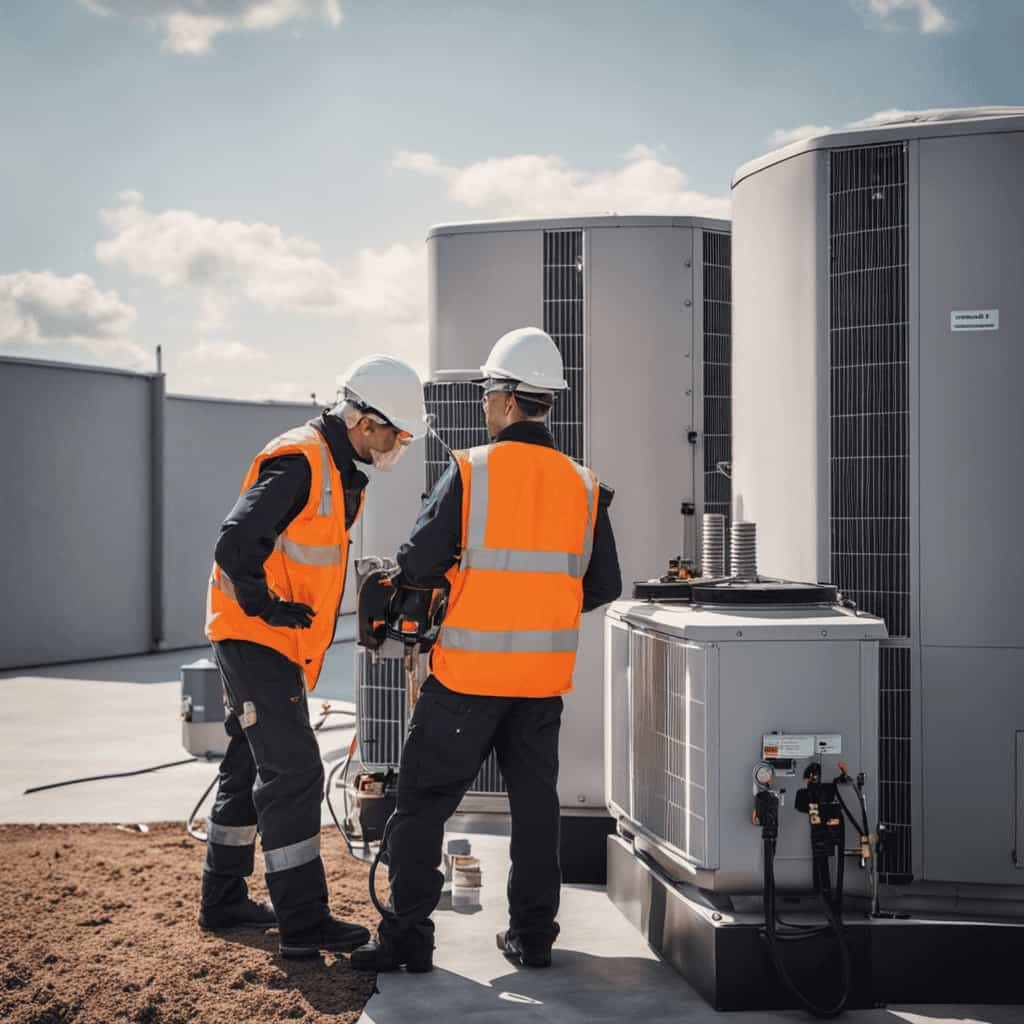
Considering these factors will help us make an informed decision about installing a heat pump system that’s best suited for our climate conditions, ensuring optimal energy efficiency and comfort in our home.
Steps to Properly Size and Design a Heat Pump System for Your Home
When it comes to properly sizing and designing a heat pump system for your home, there are a few important factors to consider.
First, you need to take into account the size of your home and the specific heating and cooling requirements.
Additionally, you should also consider the efficiency of the system and design it in a way that maximizes energy savings.

Factors Affecting Heat Pump Size
We need to consider various factors to properly size and design our heat pump system for our home. The size of the heat pump is crucial in ensuring its efficiency and effectiveness in heating or cooling our living space.
Here are some factors that affect the heat pump size:
-
Heat pump efficiency: It’s important to choose a heat pump with high efficiency ratings, such as a Seasonal Energy Efficiency Ratio (SEER) for cooling and a Heating Seasonal Performance Factor (HSPF) for heating. Higher efficiency means the heat pump can deliver more heating or cooling output for the same amount of energy consumed.
-
Heat pump capacity: This refers to the heat pump’s ability to heat or cool a specific area. Factors such as the size of the room, insulation, and climate conditions play a role in determining the required capacity. It’s important to choose a heat pump with the right capacity to effectively meet our heating or cooling needs.
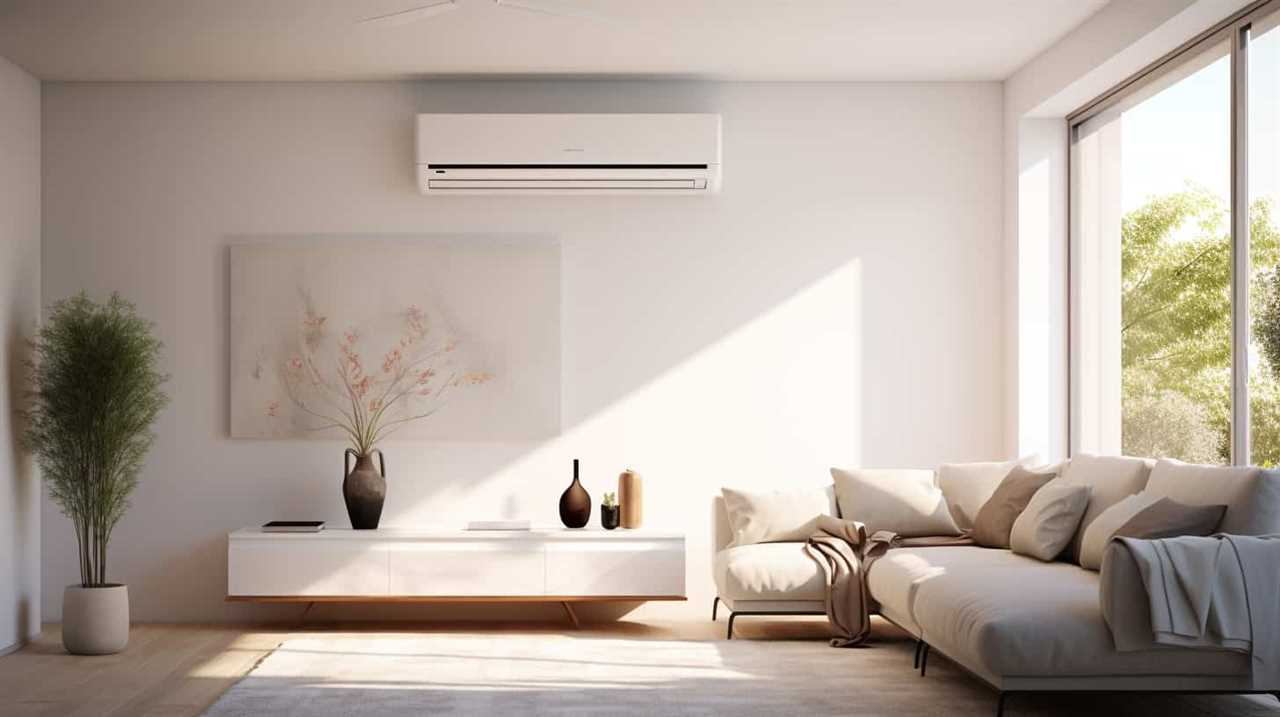
-
Climate zone: Different regions have different climate conditions, which can affect the heat pump’s performance. For example, a heat pump designed for colder climates will have a higher heating capacity to ensure efficient operation in low temperatures.
-
Ductwork: The condition and layout of the existing ductwork in our home will also impact the heat pump size. Properly sized and sealed ducts are essential for efficient heat transfer throughout the house.
Design Considerations for Efficiency
By considering the size and layout of our home, as well as the specific heating and cooling needs, we can effectively design and size a heat pump system for optimal efficiency. When it comes to designing a heat pump system, there are several key design principles to keep in mind.
First, it’s important to properly size the system based on the heating and cooling load of the home. This involves calculating the square footage, insulation levels, and number of occupants.

Additionally, the placement of the indoor and outdoor units should be strategically considered to minimize energy loss and maximize system performance.
It’s also essential to choose the right type of heat pump system, such as air-source or ground-source, based on the environmental impact and efficiency goals.
By following these design principles, we can ensure that our heat pump system is both efficient and environmentally friendly.
Now that we’ve discussed the design considerations for efficiency, let’s move on to the next step: the installation process of a heat pump system.
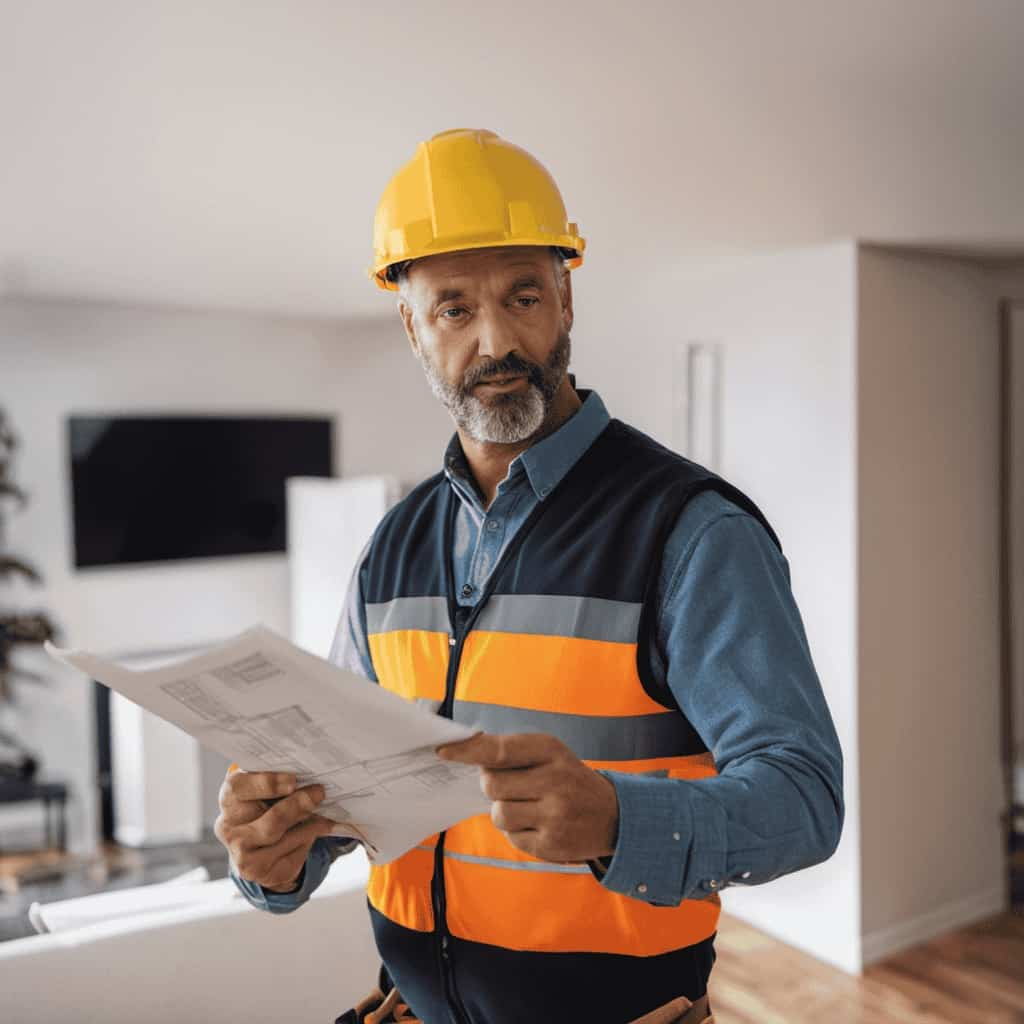
Installation Process of a Heat Pump System
The installation of a heat pump system involves several steps that we’ll guide you through in this article. Here are some heat pump installation tips to ensure a smooth and efficient process:
-
Select the right location: Choose an area with enough space and proper ventilation for the outdoor unit. Avoid placing it near windows, doors, or areas with high foot traffic.
-
Proper sizing: Ensure that the heat pump system is correctly sized for your home. Oversized or undersized units may lead to inefficiency and increased energy consumption.
-
Professional installation: Hiring a certified HVAC technician is crucial to avoid common mistakes during heat pump installation. They have the expertise to handle the electrical connections, refrigerant charge, and overall system setup.
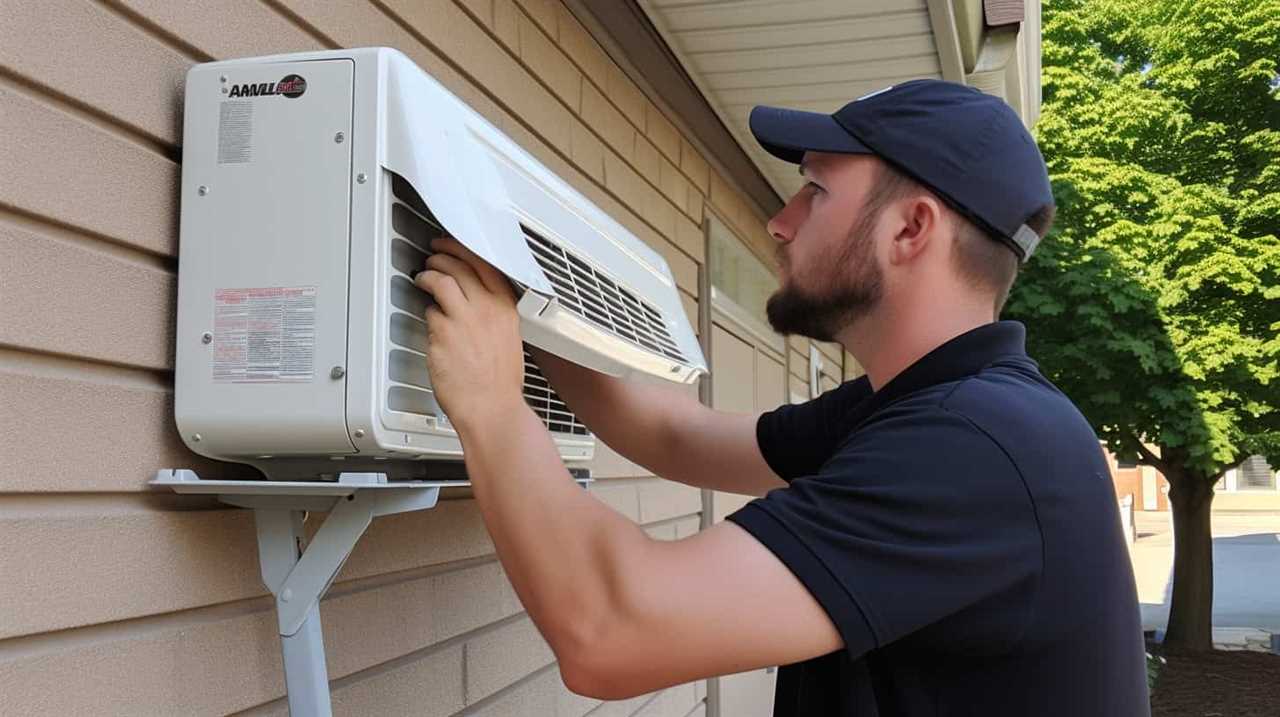
-
Regular maintenance: Once installed, it’s essential to schedule regular maintenance to keep your heat pump system running smoothly and efficiently.
Tips for Efficiently Operating and Maintaining Your Heat Pump System
Our top tip for efficiently operating and maintaining your heat pump system is regular filter cleaning. By keeping the filters clean, you ensure that the system can function optimally and efficiently. This simple maintenance task can greatly improve the performance of your heat pump and save you energy and money in the long run. Additionally, there are several other energy-saving tips that you can follow to maximize the efficiency of your heat pump system. Check out the table below for some practical suggestions:
| Energy-Saving Tips for Heat Pump Maintenance |
|---|
| Regular filter cleaning |
| Annual professional maintenance |
| Proper insulation |
| Regularly checking refrigerant levels |
| Using a programmable thermostat |
Common Troubleshooting Issues With Heat Pump Systems and How to Solve Them
Let’s address some common troubleshooting issues with heat pump systems and learn how to solve them.
Here are some troubleshooting tips for common issues:

-
No heat or cool air: Check if the thermostat is set correctly and the power is connected. Ensure that the air filters are clean and the outdoor unit is free from debris. If the issue persists, the refrigerant levels might be low, so it’s best to call a professional technician.
-
Frozen outdoor unit: This can occur due to a dirty air filter, blocked airflow, or low refrigerant levels. Turn off the unit and let it defrost, then clean or replace the air filter and check for any obstructions. If the problem continues, contact a professional for assistance.
-
Strange noises: Rattling, grinding, or squealing noises might indicate loose parts or a faulty motor. Turn off the system and visually inspect for any loose components. If the noise persists, it’s advisable to call a professional technician.
-
Inconsistent heating or cooling: This issue could be caused by a malfunctioning thermostat, improper installation, or leaky ducts. Check the thermostat settings, inspect the ductwork for any leaks, and ensure proper insulation. If the problem persists, consult a professional to diagnose and fix the issue.
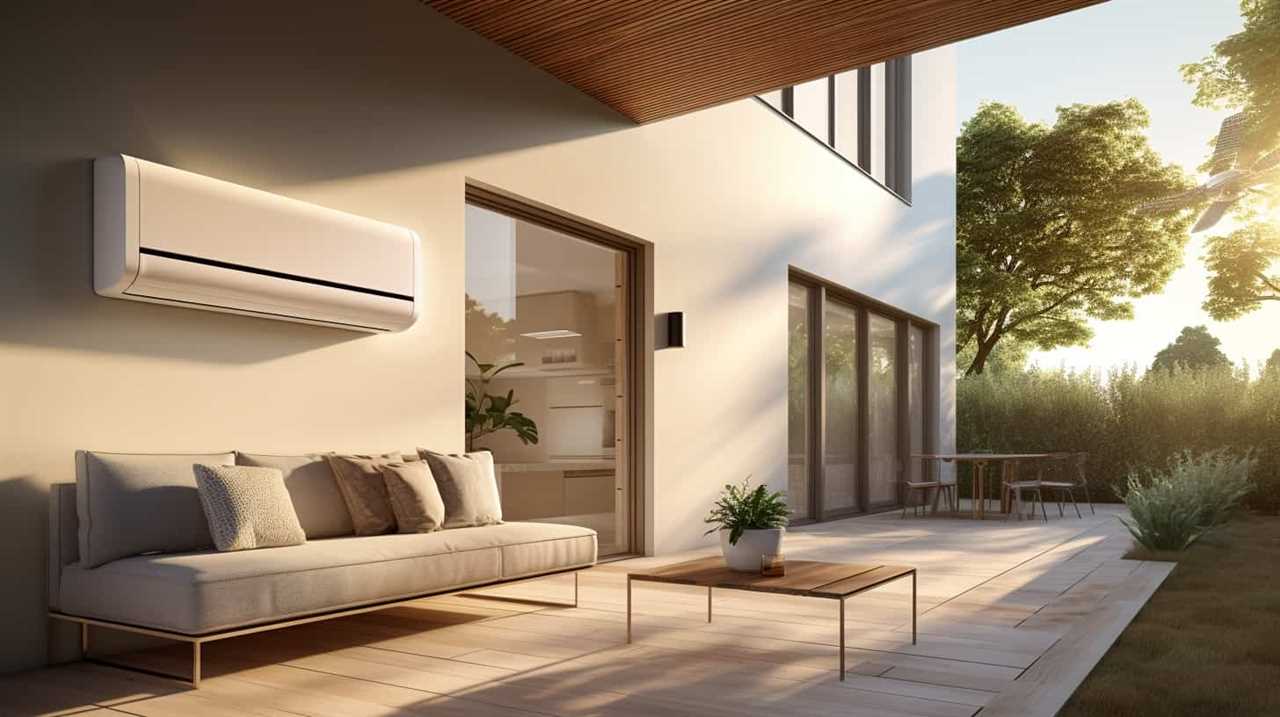
Frequently Asked Questions
How Much Money Can I Save on My Energy Bills by Using a Heat Pump System?
We can save money on our energy bills by using a heat pump system. It is cost-effective and helps in reducing energy consumption. Heat pumps are a great option for eco-friendly heating and cooling.
Can a Heat Pump System Be Used to Both Heat and Cool My Home?
Yes, a heat pump system can be used to both heat and cool your home. It has many benefits, such as energy efficiency and cost savings. To maintain optimal performance, regularly clean and inspect the system’s filters, coils, and outdoor unit.
Are There Any Government Incentives or Rebates Available for Installing a Heat Pump System?
Yes, there are government incentives and rebates available for installing a heat pump system. These incentives are part of energy efficiency programs aimed at promoting sustainable living and reducing carbon emissions.
Will a Heat Pump System Work in Extremely Cold Climates?
In extremely cold climates, a heat pump system can still work efficiently, just like a well-insulated jacket keeps us warm in freezing temperatures. Best practices for maintaining heat pump systems in cold climates include regular maintenance and ensuring proper insulation.
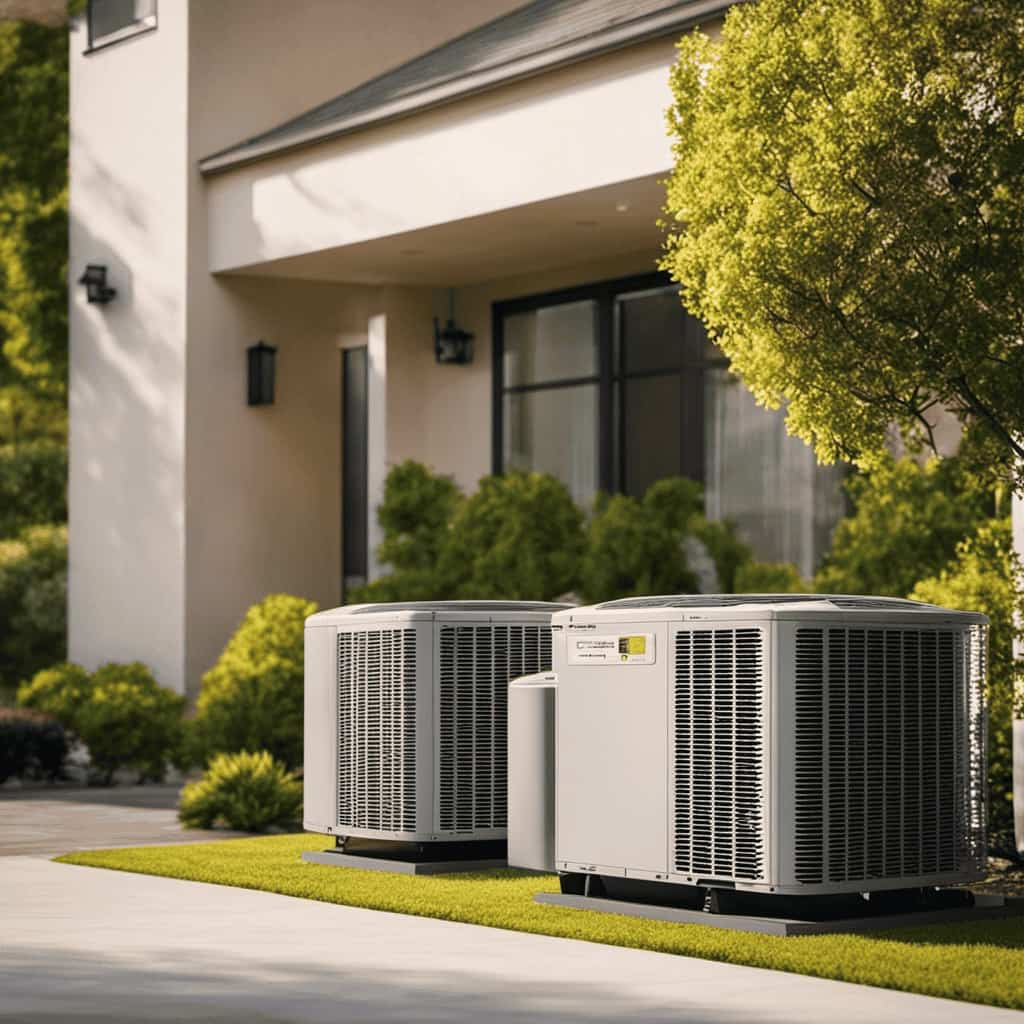
How Long Is the Expected Lifespan of a Heat Pump System?
The expected lifespan of a heat pump system depends on its maintenance requirements. With regular upkeep, a well-maintained heat pump can last around 15-20 years, providing efficient and eco-friendly heating and cooling for your home.
Conclusion
In conclusion, heat pump systems offer an eco-friendly and efficient way to heat and cool your home. By understanding the different types of heat pump systems, considering important factors, and properly sizing and designing the system, you can maximize its benefits.
Additionally, efficient operation and regular maintenance will ensure its longevity and effectiveness. Remember, ‘a stitch in time saves nine,’ so addressing troubleshooting issues promptly will prevent bigger problems in the future.
Stay informed, stay practical, and enjoy the comfort and sustainability of your heat pump system.
